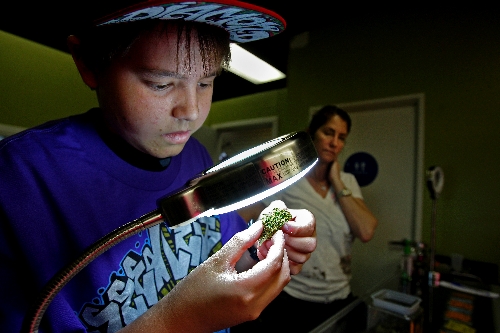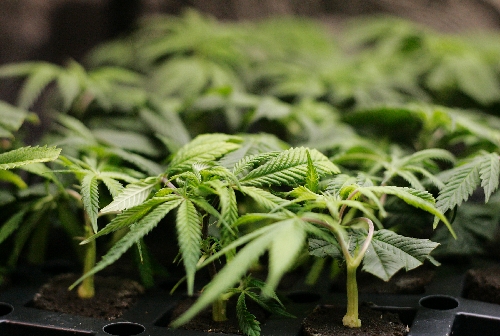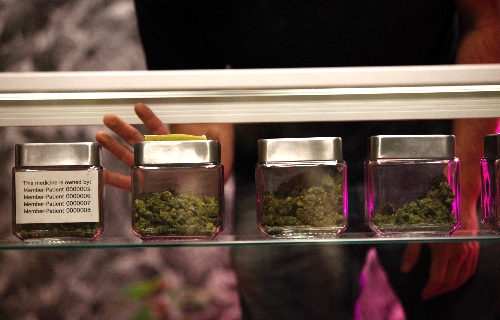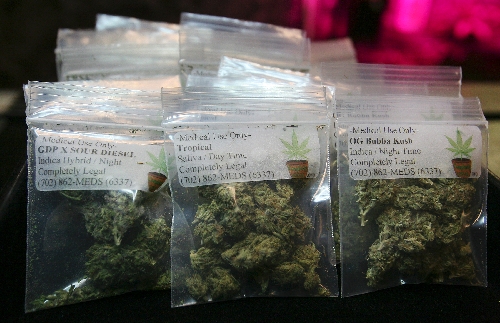Las Vegas marijuana co-operatives face legal hurdles
Sporting shaggy hair, green sunglasses and a bright yellow T-shirt that says "Weed," the boy chatting with two female employees in this office could have been any teenager. Except this 15-year-old hasn't eaten in 70 days and has already endured 30 operations.
Ryan has Crohn's disease. He is the youngest medical marijuana patient at a recently opened Las Vegas co-operative, Completely Legal. The nonprofit allows legally registered patients to donate marijuana for medical use by other co-op members.
"It saved his life," Ryan's mother, Tammy, says as she sits inside Completely Legal's waiting room, surrounded by "Weed" brand T-shirts and hats. "He has gained 30 pounds in the last few months. He was down to 80 pounds."
Ryan can't eat food because his colon was removed last year. He has a feeding tube for nourishment and carries a colostomy bag concealed by his "Weed" shirt -- a gift from Completely Legal founder Jake Lill, who at age 24 manages two co-ops in Las Vegas.
"He wore it to school today," Tammy says of Ryan's shirt, her tone indicating a hint of both surprise and parental disapproval.
Yet Tammy approves of the use of marijuana to make life better for seriously ill patients like her son. She says she learned of pot's pain-killing and medical uses from a family friend whose relative had Crohn's.
The faint smell of weed fills the air in the South Durango Drive waiting room as Tammy talks about her son's ordeal and describes his being airlifted to an out-of-state hospital a year ago to save his life.
Ryan has been battling Crohn's since he was 10. He can still suck on marijuana edibles such as hard candy.
"Medical marijuana relaxes me, helps me sleep and just helps me a lot," he says in a low voice.
Tammy makes donations to the Completely Legal co-op, as do most of the other patients.
Donations are accepted but not required, Lill says.
"When people can't afford to donate, we give a lot of medicine away," Lill says, flashing a smile. "Medical marijuana is not a drug. It is a medicine."
Lill declined to say what the average donation to the Completely Legal co-op is.
"The most I can say is we help a lot of people," he says.
Lill started two medical marijuana dispensaries in Colorado by age 21. The Rocky Mountain State now has more than a 1,000 locations distributing pot for medical use and Colorado recently moved to tax and regulate the dispensaries.
"I was one of the first 60 there," Lill says of his two Colorado dispensaries, since sold to competitor Cure Colorado.
But in Nevada -- and unlike most businesses, which are encouraged to start up and create jobs in a down economy -- Lill must be very cautious of the legal tightrope he walks.
The Silver State allows those who sign up for a Nevada Medical Marijuana Program registry in Carson City (and pay about $200) to possess up to an ounce of marijuana for medical use. Selling pot for any purpose is still illegal in the state.
Marijuana was legalized in Nevada for medical uses as a result of a voter-approved ballot measure in 2000. A doctor must first recommend in writing that the plant, in some form, should be taken by the patient for a medical condition.
Lill knows Nevada's law, and says his member-owned co-op is legal.
"This is not a dispensary. A dispensary is illegal in Nevada," Lill says. "A lot of patients incorrectly say that because they have been to other places that were called dispensaries. We are a nonprofit co-op."
The Completely Legal on South Durango Drive opened in October, around the same time police raids targeted about a dozen alleged dispensaries. A second co-op location, on North Durango Drive, opened late last month. More outlets are planned for the valley.
Lill is a medical marijuana patient himself. He uses it to treat lingering pain from a childhood staph infection to his knee and his bipolar condition.
"It helps me day in and day out," Lill says. "I used to take prescription drugs, but they zombied me out."
A plethora of candy bowls brimming with miniature peanut butter cups, tiny candy bars and hard and soft candy line the North Durango waiting room ready to ease the munchies. Donated marijuana plants keep warm under a heat lamp in a back room and plant clones, cannabis strains and compounds are kept in a glass display case away from public view. After checking in at Completely Legal's front desk and showing their Nevada medical marijuana registry cards, patients are eventually taken to the back room, where they can view and select from pot plants and marijuana mixtures.
One co-op is decorated with bongs, used only as artwork. But Lill says no pot is grown or smoked on Completely Legal's premises. Different cannabis strains produce different effects. Some strains increase the appetite, while others ease pain, anxiety and depression or induce sleep, Lill notes. He is dressed this day in jeans and a T-shirt adorned with a leafy pot plant.
Ryan can't eat food anymore, so technicians were careful not to give the teen a type of marijuana that would make him hungry, mom Tammy says.
Ryan, looking relatively healthy on this particular day, would spend all the next in a hospital emergency room. "Another infection!" his mom would later lament.
Viewing the 15-year-old's plight was "heartbreaking," Lill says. Still, he really loves his job. He calls himself "a healer," and is not worried about the critics.
"I was always an avid lover of marijuana, not just smoking a joint, but reading a (cannabis) book like, 'Let's figure this out.' "
Completely Legal technicians take the donated pot plants and bags of dried marijuana and make medicine in the form of drinks, lollipops and other concoctions such as a minestrone soup concentrate containing hash.
Completely Legal's proprietary blends are "Hashuccino" coffee, a packaged blend of cappuccino mixed with 0.3 grams of hash.
"A little bit of hash coffee will wake you right up," Lill promises.
And there's Strawberry Crack, which contains no crack. It is a colorfully named strain of marijuana.
"Right now, we have 30 or 32 strains," Lill says. "We have a strain for pain, for appetite issues."
A frail-looking 55-year-old woman, who goes by "Kittie," uses medical marijuana to put on weight. She takes myriad heart medications.
"I didn't want to be all bones. I am a size 4 now," the ponytailed woman says.
Kittie, who's malfunctioning defibrillator implant was "shocking" her heart at the wrong times, also suffers from chronic pain and anxiety.
She appears to be among the sickest people in the Completely Legal office on a recent day.
"I could go into cardiac arrest at any time," Kittie says, nervously wringing her bony hands.
"We had law enforcement here a few times, but we are helping patients," Lill says. "Patients sign a piece of paper saying they know this is not a dispensary."
Some of the operations shut down by the Metropolitan Police Department may have crossed the line into becoming dispensaries, Lill surmises.
"A dispensary is a for-profit entity that dispenses marijuana," he says.
Ryan Kraft, a Metropolitan Police undercover detective, was involved in many of the raids on businesses that were allegedly violating Nevada's laws concerning the sale, possession and distribution of medical marijuana.
"Collectives, co-operatives and dispensaries are not legal in the state of Nevada," he says.
The detective declined to comment on Completely Legal's operational model, saying he had not seen the nonprofit.
Kraft says he has doubts about there being legal operations in Nevada when it comes to distributing marijuana.
"In every single one of these investigations, the operations were the same," he says of the raids. "They (people) came to the storefront and get marijuana and they leave."
Kraft says the gray area may come when an operation truly offers free marijuana to those people registered as patients with the state.
"If they are giving it away, it may not be illegal," he adds.
Kraft doesn't buy into the argument that everyone registering to possess marijuana is using it for medical purposes.
"Marijuana is not a medicine. I have AIDS patients that tell me using methamphetamine helps relieve their symptoms, too," he says.
However, Kraft says the law allows those in the state's patient registry to possess up to an ounce of pot, have up to three mature (flowering) cannabis plants and have as many as four immature (nonflowering) cannabis plants.
Judy Blewett admits to being a little nervous about her for-profit medical marijuana edible business, The Herbal Chef, but has only praise for the Metropolitan Police.
"I was threatened by somebody once, and called the police, and they took care of it right away," she recalls. "I am 100 percent donation."
Blewett, who is a registered medical marijuana patient herself, doesn't sell smokable cannabis as Completely Legal does. The Herbal Chef sticks to edibles, including cookies, brownies and drops that go under the tongue.
She blames the state government -- not the local police -- for all the legal risks shops face.
"The state has had 11 years to make a playbook and they have not done that," Blewett opines.
Kraft, however, sees no need for patients to go to a storefront to share their marijuana with other registered patients for free.
"According to the law, there is no prohibition against (patients) sharing it with one another, or against them distributing it to one another," he says. "But I don't know how you can have a business model on that."
Contact reporter Valerie Miller at vmiller@lvbusinesspress.com or 702-387-5286.

























